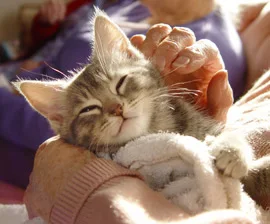The way you yourself would want to be treated.
So, if you’re thinking of adopting a cat, keep in mind these tips about how to keep him healthy and happy.
1. Like dogs, cats need to be fed good, nutritious food regularly, at least once a day. Cats also need plenty of cool, clean, fresh water. Adult cats do NOT need milk, which might make them fat and give them diarrhea.
2. Keep your cat INSIDE your home with you. But keep him in a separate room from birds and fish, which cats will attack. Also keep him away from house plants, which cats may destroy. Certain plants are also poisonous to cats.
3. Unlike dogs, cats do NOT need to go outside. Cats are almost always naturally housebroken and will use a litter box even at an early age. Allowed outside alone, cats often get lost or hurt and sometimes get killed. Also, don’t leave your cat alone in a room with an open window.
5. Unlike most dogs, cats do NOT need to be bathed. A healthy cat keeps himself clean and well groomed. If your cat has medium to long fur, grooming is essential, as the fur can mat and cause sores. Brushing your cat regularly is wonderful for your cat and creates a bonding experience for you both.
6. De-clawing your cat is very dangerous. Do NOT have your cat declawed.
Declawing has been compared to removing your fingernails. Not true!
Declawing cats is like having your fingers amputated up to the knuckle.
Would you like it? To prevent your cat from scratching or tearing your furniture, trim his claws regularly and provide him with a small rug or scratching post.
Declawing a cat can also cause behavioral problems. Cats that have been declawed often times will not use the litter box, as the cats paws are too sensitive and painful.
Note: (I recently watched on the Animal Planet "Cats From Hell", and saw ALL the behavior problems associated with de-clawing...VERY sad. It was noted that many of cats that are surrendered to shelters, are de-clawed.)
7. Is your cat being over vaccinated? Read here about the dangers of over vaccinating your pet.
8. Give your cat plenty of love and affection. Though cats are more independent than dogs, they thrive on your companionship. Talking and playing with your kitty is essential for their health.The nicer you treat a cat, the better your cat will be to you!
Also, if you do plan to adopt a cat we recommend that you consider TWO cats. Two are company for each other – and two will bring more love into your life!
9. If kittens are adopted before they are at least 8 weeks old, many times there are behavioral problems. If the mother stops breastfeeding, please don't feed your kitty milk.They sell a product called "KMR", which is a formula for kittens, just like we have "formulas" for human babies.
The major pet supply stores carry this product. At about 4 weeks old, mix KMR into a little wet food to get the kittens used to eating solid food.
RELATED: Caring for Kittens and Cats
DO NOT DO THE FOLLOWING





